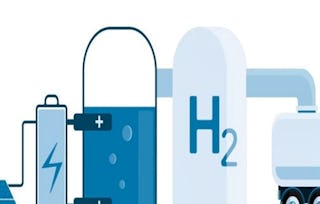Are you interested in hydrogen? Perhaps considering a carrier within hydrogen? Then you may need to learn or brush up key concepts, potentials and challenges regarding hydrogen.

Hydrogen: Key Concepts and Use in Green Technologies

Hydrogen: Key Concepts and Use in Green Technologies


Instructors: Pernille Gøtz
1,515 already enrolled
Included with
15 reviews
Recommended experience
What you'll learn
Key concepts of hydrogen: Introduction, electrolysis, fuel cells, electrochemistry, and modelling.
Knowledge of maturity of hydrogen technologies.
Knowledge of techno-economic assessment of hydrogen technologies and projects.
Skills you'll gain
Details to know

Add to your LinkedIn profile
12 assignments
See how employees at top companies are mastering in-demand skills

There are 11 modules in this course
In this module you are introduced to the course content and modules. You will learn how to navigate the course and what is needed if you want to collect points for a Coursera Certificate.
What's included
1 video6 readings1 discussion prompt
In this module, Anke Hagen from DTU Energy introduces you to the what, why and how of hydrogen, preparing you for diving deeper into the core technologies of green hydrogen production in the following modules.
What's included
1 video2 readings1 assignment1 discussion prompt
In this module you will do a self-study on the status of green hydrogen production by reading an annual report on hydrogen and exploring hydrogen projects in your region.
What's included
2 readings3 assignments1 discussion prompt
In this module Anastasiia Konovalova from DTU Energy introduces key theoretical aspects of electrochemistry needed to understand and discuss hydrogen production via electrolysis.
What's included
5 videos6 readings1 assignment1 discussion prompt
In this module, Anke Hagen from DTU Energy introduces you to the most used types of electrolysis, the materials of cells and stacks, and selected commercial applications.
What's included
1 video2 readings1 assignment1 discussion prompt
In this module, Anke Hagen from DTU Energy introduces you to the basics of fuel cells: materials, function, and applications.
What's included
1 video2 readings2 assignments1 discussion prompt
In this module you are invited into the laboratories at DTU Energy where electrolysis cells and fuel cells are made and developed.
What's included
2 readings1 discussion prompt
In this module, Arash Nemati from DTU Energy introduces you to modelling at cell and stack level, and Rafael Nogueira Nakashima from DTU Energy introduces you to modelling at system level for electrolysis and fuel cell technologies.
What's included
3 videos4 readings2 assignments1 discussion prompt
In this module you will learn about the basics about the concept of "balance-of-plant" (BoP) of hydrogen systems - an important concept to know when developing hydrogen projects.
What's included
2 readings1 discussion prompt
In this module, Michael Bruhn Barfod from DTU Management presents a case on techno-economic assessment of a hydrogen project in the maritime sector.
What's included
1 video2 readings1 assignment1 discussion prompt
In this module we will wrap up the course and give you inspiration to learning more about hydrogen.
What's included
2 readings1 assignment
Instructors


Offered by
Explore more from Environmental Science and Sustainability
 Status: Free Trial
Status: Free Trial Status: Preview
Status: PreviewTechnical University of Denmark (DTU)
 Status: Preview
Status: PreviewTechnical University of Denmark (DTU)
 Status: Free Trial
Status: Free TrialUniversity of Colorado Boulder
Why people choose Coursera for their career

Felipe M.

Jennifer J.

Larry W.

Chaitanya A.
Learner reviews
- 5 stars
66.66%
- 4 stars
33.33%
- 3 stars
0%
- 2 stars
0%
- 1 star
0%
Showing 3 of 15
Reviewed on Aug 16, 2025
This course is perfectly designed for those who want to start their career in hydrogen green energy, fuel cell(PEMFC AND SOEC)

Open new doors with Coursera Plus
Unlimited access to 10,000+ world-class courses, hands-on projects, and job-ready certificate programs - all included in your subscription
Advance your career with an online degree
Earn a degree from world-class universities - 100% online
Join over 3,400 global companies that choose Coursera for Business
Upskill your employees to excel in the digital economy
Frequently asked questions
To access the course materials, assignments and to earn a Certificate, you will need to purchase the Certificate experience when you enroll in a course. You can try a Free Trial instead, or apply for Financial Aid. The course may offer 'Full Course, No Certificate' instead. This option lets you see all course materials, submit required assessments, and get a final grade. This also means that you will not be able to purchase a Certificate experience.
When you purchase a Certificate you get access to all course materials, including graded assignments. Upon completing the course, your electronic Certificate will be added to your Accomplishments page - from there, you can print your Certificate or add it to your LinkedIn profile.
Yes. In select learning programs, you can apply for financial aid or a scholarship if you can’t afford the enrollment fee. If fin aid or scholarship is available for your learning program selection, you’ll find a link to apply on the description page.
More questions
Financial aid available,

